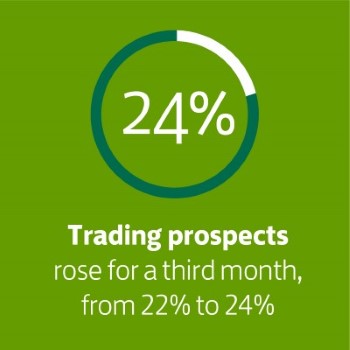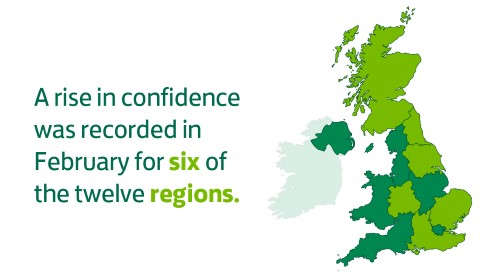Our purpose and strategy
Our purpose is Helping Britain Prosper.
28 February 2020
The latest Lloyds Bank Business Barometer shows:
Overall business confidence remained high in February, maintaining its surge since January, according to the Lloyds Bank Commercial Banking Business Barometer. The survey showed that overall business confidence remained at 23%, having risen for five consecutive months to January’s a 14-month high, and rising back towards the long-term average of 25%. Within that, firms reporting stronger economic optimism stayed at 23%, the highest since September 2018.
Overall business confidence is calculated by averaging the views of 1,200 companies on their business prospects and optimism about the UK economy.
 February continued to see a rise in trading prospects, increasing for the third month in a row to 24% from 22%, a ten-month high. Similar to last month, 37% of firms anticipate an improvement in their trading prospects, while 13%, down from 15% expect a decrease.
February continued to see a rise in trading prospects, increasing for the third month in a row to 24% from 22%, a ten-month high. Similar to last month, 37% of firms anticipate an improvement in their trading prospects, while 13%, down from 15% expect a decrease.
Concerns about the UK leaving the EU eased significantly in February and returned to positive sentiment for the first time since September 2018, to 7% from -7% last month. Businesses’ views on the impact of leaving the EU were more optimistic, with 34% of businesses believing the UK’s exit will have a positive impact (up from 27%), while 25% (down from 34%) continue to expect a negative impact.

The buoyed outlook continued to be reflected in firms’ assessment of their own hiring intentions, which rose for a fourth consecutive month to 16% from 15%, the highest since December 2018. The number of firms expecting higher staffing levels remained unchanged, with a third of businesses (34%) expecting to increase employment. Those anticipating a reduction decreased by one point to 18%.
“The buoyed sustained results signal a return to economic growth for the first quarter of 2020 after a relatively flat final quarter end to 2019. The third consecutive rise in trading prospects and a swing to positive sentiment on the expected impact of leaving the EU are all tentative signs of improvement after the soft end to last year.”
- Hann-Ju Ho, Senior Economist, Lloyds Bank Commercial Banking
From a regional perspective, London was the most confident region (29%), followed by the West (28%) and East (27%) Midlands.
The East of England (26%), the South East (24%) and the South West (24%), remained close to the UK average of 23%. The least confident regions were the Northern Ireland (-8%) and Wales (-2%), both moving into negative sentiment.
In February, overall business confidence fell slightly in the services sector from 19% to 21% but remained significantly above the 4% level at the end of 2019. Confidence in the manufacturing sector bounced back by 10 points to 31%, while the construction and retail sector increased by two and six points 29% and 30% respectively.
“It is encouraging to see that the regions are starting to align to the long-term national average. London has continued its strong start to the year and with Scottish confidence bouncing back, it could signal businesses’ positive reaction to greater political certainty. The slight decline in services’ confidence was offset by improvements in the other sectors. With the third consecutive rise in trading prospects, this ten-month high should signal further growth as we continue into 2020 as businesses begin to respond to this confidence by making investment decisions.”
Paul Gordon, Managing Director for SME and Mid Corporates, Lloyds Bank Commercial Banking
